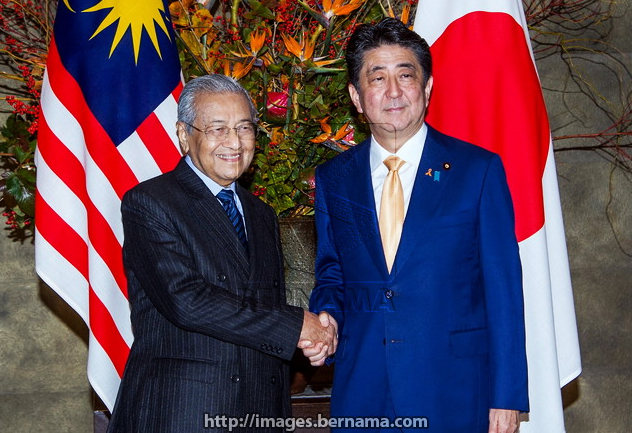
Malaysia Prime Minister Tun Dr Mahathir Mohamad and Japan’s Prime Minister
Shinzo Abe during state visit to Tokyo, Japan on Nov 6, 2018. Photo courtesy of Bernama
TOKYO, May 29 (NNN-Bernama) — Malaysia-Japan relations, which had been elevated to a new level since the rejuvenation of the Look East Policy (LEP) is now stronger than ever, bolstered by deeper economic ties and collaborations.
Malaysian Ambassador to Japan Datuk Kennedy Jawan said Japanese investors’ sentiment was positive towards Malaysia, with a lot of renewed interests.
Their confidence is based on Malaysia’s economic development and this can be seen in the success of the Samurai bond recently, which was a testament of the country’s economy by various Japanese institutions and investors.
The government has successfully issued the Samurai Bond in March with an oversubscription of more than 1.6 times at 324.7 billion yen against 200 billion yen offered.
“These are the indicators of how they foresee our economic growth in the coming years. We are working very hard and Prime Minister’s engagement with the Japanese business sectors in his visit starting tomorrow, is one of the many platforms that we’re promoting investment in Malaysia,” Kennedy told a group of Malaysian reporters here, today.
Prime Minister Tun Dr Mahathir Mohamad will be making a three-day working visit to the country starting tomorrow to attend the 25th International Conference on The Future of Asia.
He will also attend the Malaysia-Japan Business Dialogue jointly organised by the Malaysian Investment Development Authority (MIDA) and Japan External Trade Organisation (Jetro)
Kennedy said the Japanese were very comfortable with Malaysia because of the country’s economic and political stability, as well as its cost competitiveness.
“We have a lot of collaborations in the pipeline providing us with the foundation to strengthen bilateral cooperation not only in the traditional sectors such as manufacturing but also in new non-traditional avenues such as Artificial Intelligence and high-end sectors,” he said.
On education, Kennedy said Malaysia was still studying on how to collaborate with Japan to ensure the education system could create skilled human resources, focusing on the technical and vocational, education and training (TVET).
“We are learning from Japan. For example, here they have Kosen education system with more than 50 campuses nationwide,” Kennedy said.
The main characteristic of a Kosen is its five years of consistent engineering education starting when the students are 15 years old, and with the addition of the 2-year advanced course, seven years of consistent education is conducted.
Established in 1961 in response to strong demand from the industrial sector to foster engineers who sustained the high Japanese economic growth at that time, Kosen is the first of its kind in the world.
Approximately 300,000 students have graduated so far, contributing actively not only in the industrial world but also in the academic sector, as engineers, researchers, managers and so on.
A majority of the RM21.7 billion foreign direct investment (FDI) posted by Malaysia in the first quarter of 2019 was contributed by Japan at RM8.4 billion.
In the manufacturing sector, as of December 2018, a total of 2,661 manufacturing projects with participation from Japan have been implemented with a total investment of RM84.2 billion, generating 342,882 jobs in Malaysia.
Potential sectors for Japanese investors in Malaysia are electrical and electronic products, food manufacturing, vehicle equipment, rubber products, chemical products and machinery and machinery.
Japan was Malaysia’s fourth largest global trading partner in 2018 with bilateral trade recorded at RM132.57 billion (US$32.86 billion).
For Japan, Malaysia is its 14th largest global trading partner, and fifth among the ASEAN countries after Thailand, Vietnam, Indonesia and Singapore.
NNN-BERNAMA





